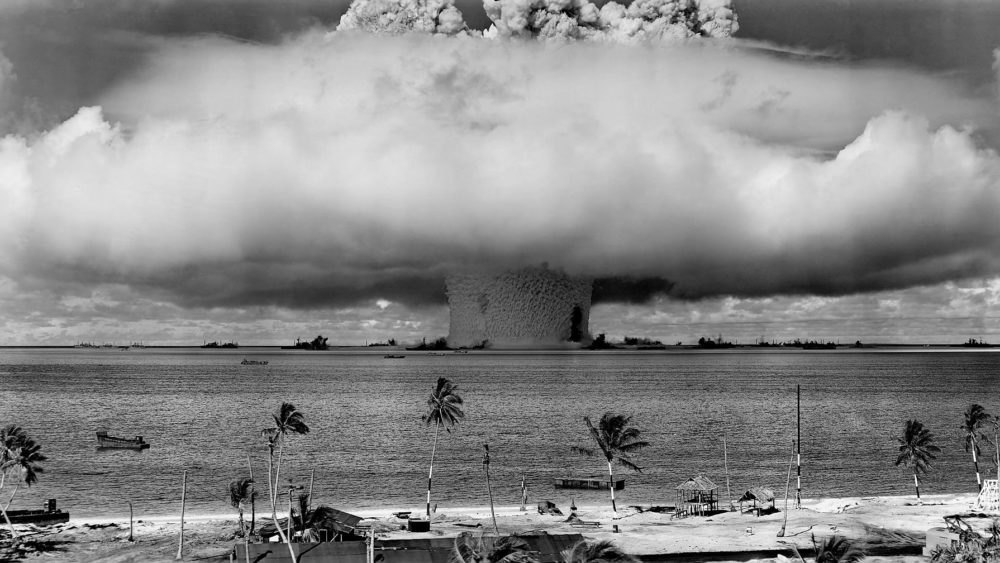The United States of America is the first nuclear power — and the only one to have used its weapons for a military purpose. During World War 2 in 1945, two Japanese cities were bombed by US nuclear bombs (Hiroshima on August 6th and Nagasaki August 9th ). The devastating result was approximately 225,000 people either dead or wounded. The number of deaths in Hiroshima and Nagasaki due to exposure to lethal radiation is still being discussed, but it is certainly in the thousands.
However, even though nuclear weapons were never used again for military purposes, nuclear testing took (and continues to take) a toll on thousands of lives in Australia and Oceania.
The United States conducted about 1,054 nuclear tests from 1945 to 1992, and 105 of them (1945-1962) were made at Pacific Test Sites (Marshall Islands, Kiribati) causing the contamination of huge areas controlled by US troops. In the Pacific, this caused rising numbers of cancer and birth defects, especially on the Marshall Islands where 67 tests were made and many Marshallese were forced to leave their homes in contaminated areas.
European nuclear powers, such as France and the UK, have also “contributed” to the deaths of thousands.
France has made over 193 nuclear tests in the Pacific between 1960 and 1996, mostly on Mururoa and Fangataufa atolls that belong to French Polynesia, as well as 17 tests in Algerian Sahara. Tahiti, the most populated island of French Polynesia, was exposed to 500 times the maximum accepted levels of radiation. The impact has spread as far as to the tourist island of Bora Bora.
Civilians and the military participating in nuclear tests (more than 100,000 of them) have experienced diarrhea, skin injuries, blindness, and cancer. Their children have additionally suffered from birth defects.
From 1953 to 1963, there were over 20 bigger and smaller British A- bomb tests in Emu Farm, and the Maralinga and Montebello Islands of Australia. Overall, over 1200 peoples were exposed to radiation in the country, most of them Anangu people living in the Maralinga area. The UK has also made nuclear tests on overseas territories such as the Malden Islands and Christmas Island ( the present Republic of Kiribati).
So, what was done by the governments of the US, UK, Australia and France to help those who have suffered from radiation related illnesses, or those who lost their loved ones?
There are two answers. One is that loss of loved ones, of the way you live your life, of the nature that surrounds you, the loss of home cannot be repaid or replaced with anything else. The other is that aforementioned governments did little.
The US has awarded more than $63 million to Marshallese with radiogenic illnesses despite the fact that the Tribunal only has $45.75 million to award for both health and land claims. France is still avoiding paying reparations to Tahitians.
As for the “joint venture” of the UK and Australia, the truth is that tests were approved and conducted in the first place because British officials were misinforming Australians. The Maralinga Tjarutja (Council) of Anangu people has a compensation settlement with the Australian government, and they are receiving $13.5 million.
75 years after Hiroshima and Nagasaki, we must ask ourselves: Why are we so callous about many “Hiroshimas” and “Nagasakis” that happened over the following decades? Did we let them happen just because they took place in far-off islands in the Pacific or in the Australian desert?
The only way to deal with these existing and future horrors that can eradicate life on Earth is to heal these existing wounds.
This means that the governments of the US, UK, France and Australia must pay just reparations to the affected countries and regions. Progressives of the world must act united against the threat of nuclear holocaust and create a political climate in which it would be possible to take action on an international level in order to ban the production, storage and use of nuclear weapons.
This can be done if nuclear powers, followed by all member states, sign the United Nation’s Treaty on the Prohibition of Nuclear Weapons.
Aleksandar Novaković is a historian and dramatist. He is a member of DSC Belgrade 1 and the thematic DSC Peace and International Policy 1
Do you want to be informed of DiEM25's actions? Sign up here










